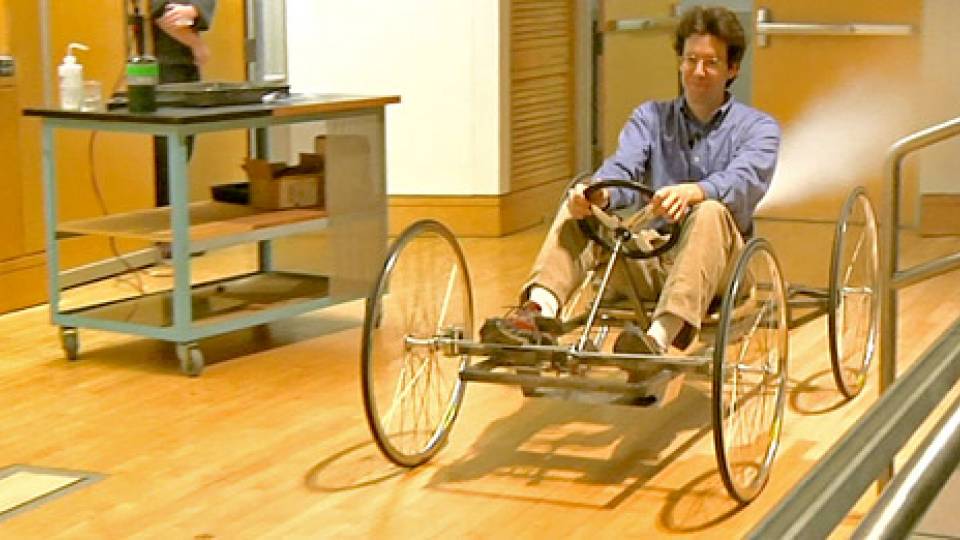Princeton researchers have garnered three of the top five Blavatnik Awards for Young Scientists bestowed by the New York Academy of Sciences.
Steven Gubser, a professor of physics, Laura Landweber, an associate professor of ecology and evolutionary biology, and Andrew Houck, an assistant professor of electrical engineering, were named awardees at the academy's fifth annual Science & the City Gala on Nov. 17 in New York. Gubser and Landweber each will receive $25,000 in unrestricted funds for their work. Houck, who was recognized for his work as a postdoctoral fellow at Yale University, will receive $15,000 in unrestricted funds for his research.
Faculty finalists, including Saeed Tavazoie, an associate professor of molecular biology and member of the Lewis-Sigler Institute for Integrative Genomics at Princeton, also were presented with $10,000 grants.
The Blavatnik Awards recognize the achievements of young scientists and engineers from New York, New Jersey and Connecticut who have contributed significantly to interdisciplinary research in the life sciences, physical sciences and engineering.
The winners were chosen from 16 finalists -- nine faculty finalists and seven postdoctoral finalists -- who represent a broad range of scientific disciplines, are affiliated with nine research institutions and hail from eight countries. Some 100 faculty and 50 postdoctoral fellows, representing 28 institutions, were nominated for the awards. Finalists and winners were chosen by a distinguished panel of 52 judges representing more than 35 academic, research and other institutions.
"We are extremely pleased to be able once again to recognize the best young scientists that our area's academic and research institutions have to offer," said academy President Ellis Rubinstein.
The Blavatnik Awards were established by Len Blavatnik, chairman of Access Industries Inc., a New York-based international industrial group. "Young scientists deserve our support and encouragement to make the discoveries needed for our future development," Blavatnik said.
Gubser's recent research focuses on how the behavior of black holes in string theory sheds light on the dynamics of the quark-gluon plasma. The quark-gluon plasma is a high-temperature state of matter produced in collisions of heavy ions.
He earned his undergraduate degree in physics from Princeton as the class of 1994 valedictorian and went on to earn his Ph.D. in physics from the University in 1998. After postdoctoral work at Harvard University, he joined the Princeton faculty in 2000. His awards include the European Physical Society's Gribov Medal and the American Physical Society's Apker Award.
Landweber is researching the origin and evolution of genes and genome rearrangement, with particular focus on Oxytricha trifallax, a single-celled pond-dwelling organism that undergoes massive genome reorganization during development.
Landweber graduated with highest honors in molecular biology from Princeton in 1989. After earning her Ph.D. from Harvard University she joined the Princeton faculty in 1994. She won the Tulip Prize for DNA computing in 2001. She also has been elected a fellow of the American Association for the Advancement of Science and a councilor of the Society for Molecular Biology and Evolution.
Landweber and Gubser are married.
Houck, who wants to build the world's first quantum computer, studies electronics on a microscopic level. He is focused on developing fully quantum mechanical circuits.
He joined the Princeton faculty in September. He earned his bachelor's degree in electrical engineering from Princeton, graduating as the valedictorian of the class of 2000. After earning his Ph.D. in experimental physics from Harvard University in 2005, he conducted postdoctoral research at Yale University.
Tavazoie is working to understand microbial behaviors from a cognitive perspective. He joined the Princeton faculty in 2000 after earning a Ph.D. from Harvard University. He has won a National Institutes of Health Director's Pioneer Award and a CAREER Award from the National Science Foundation.
